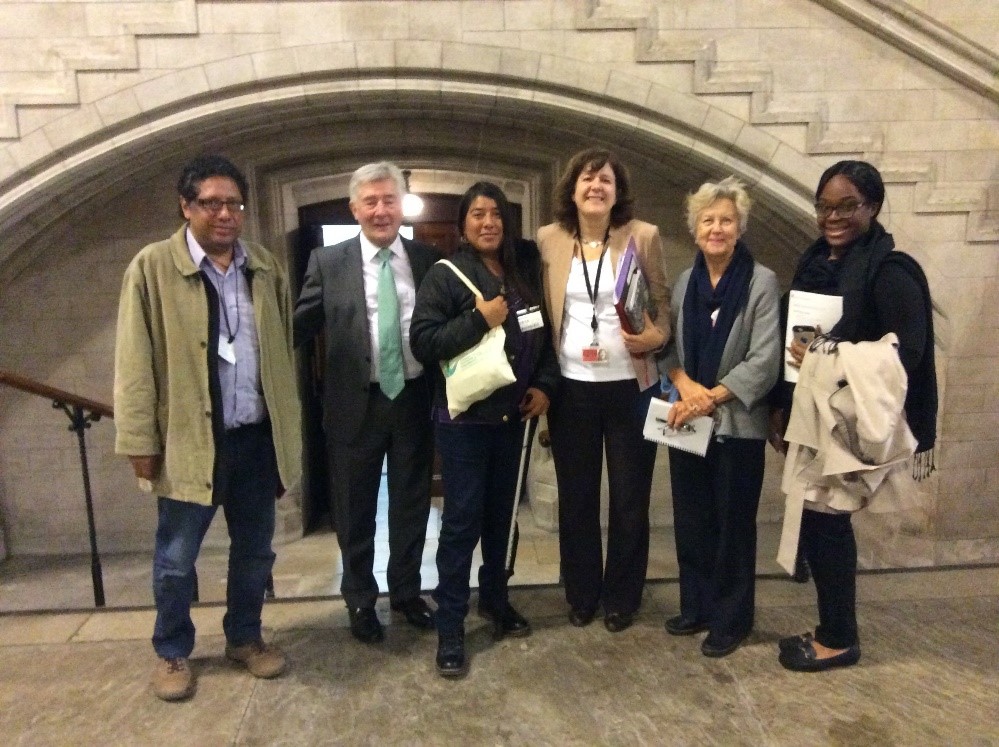The All-Party Parliamentary Human Rights Group (PHRG) met with human rights defenders (HRDs) Marcos Leyva and Rosalinda Dionicio on 18 October to discuss their work with indigenous communities whose rights are being violated.
The speakers from Oaxaca region were:
- Marcos Leyva- Director of EDUCA, an NGO that works with indigenous communities (ML);
- Rosalinda Dionicio- representing COPUVO, a group that brings together local communities to organise peaceful resistance to a local mining project (RD). Rosalinda was herself permanently injured in an attack in 2012 in which one of her colleagues was killed – see below for further information.
The main points which arose were as follows:
- Oaxaca is an area abundant in mineral resources, and there has been mining activity in the region for the past 10 years. The activities of a Canadian company has generated a series of human rights violations, as well as the destruction of the social fabric, and the persecution of HRDs and accusations being made against them. This is only one of many communities where this is happening, although the Mexican President says everything in the country is fine. (RD)
- In one case involving two murders the suspects who had been detained by the authorities have been released; information about the case has been distorted by the authorities. The human rights institution in Oaxaca has provided Rosalinda with protective measures, such as one armed guard, although he is a state official. (RD)
- Mexico is going through a severe human rights crisis; between 2012 and 2016 there were 302 human rights violations affecting 1,500 individuals. In the first seven months of this year, 30 HRDs were assassinated and 8 disappeared. According to official figures, 30,000 people have been disappeared since Mexican armed forces started carrying out security operations; in many of these cases it is not known why they were disappeared. There have also been severe roll-backs on civil and political rights, with some legislation limiting the work of HRDs. There is a Government funded National Mechanism for the protection of HRDs and journalists but its budget has been severely scaled back and many CSOs no longer engage with it. (ML)
- One of the biggest threats to land rights HRDs is the behaviour of national and transnational companies, and their attacks on communities. There are disputes about who controls the land, and indigenous peoples who claim their rights are often at a disadvantage. (ML)
- HRDs are increasingly criminalised and harassed, and there is often no investigation into attacks on HRDs. This violence against HRDs occurs throughout Mexico. In the south the HRDs’ work relates more to land and environment rights, while in the north it is more focused on the rights of migrants going from Central America to the US. (ML)
- Paramilitary groups are also a growing problem in Mexico. In Chiapas now you see more paramilitary groups, and cases involving the murder of HRDs which have been investigated by civil society organisations highlight relationships between paramilitary groups and companies. (ML)
- It is feared that the ‘Human Rights and Democracy Clause’ will not be sufficiently strengthened during the review of the Free Trade Agreement between the EU and Mexico; it would be helpful if that clause provided for an overview/complaints mechanism to be established, where civil society could have a role. (ML)
The PHRG will continue to monitor the human rights situation in Mexico closely and to raise its concerns, particularly the need for greater protection of HRDs and the investigation of crimes committed against them, with relevant interlocutors.
MURDER OF BENARDO VASQUEZ SANCHEZ
Bernardo Vásquez Sánchez was murdered on March 15, 2012 when an armed group, presumed to have been hired by the municipal authority in San José del Progreso that, at the same time, is closely tied to the interests of the mining company, ambushed Bernardo, his brother Andres and Rosalinda Dionisio Sánchez by the crossroads at Santa Lucía Ocotlán at approximately 9 at night when they were headed to their community. Four months before being murdered, graffiti appeared in a drainage canal near the edge of the urban area and he received threatening text messages: “your end is here,” a threat that was carried out on March 15, 2012. Members of CPUVO told the Civil Mission that the state authorities were aware of these threats, but they did not take any preventive measures.
For more information, see the report by clicking on this link.


